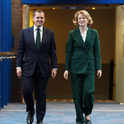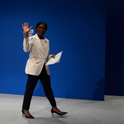On 20th November 1996 British politics changed. It went digital. On that day, computers and databases were mobilised in a new precision warfare. Instead of a face-to-face battle of ideologies, where victory goes to the party which convinces voters that its views are the right ones, the new politics is a hit-and-run guerrilla warfare where facts serve as bullets and the victor is the party which gets more of its intended message into the public domain.
This is the politics of manoeuvre and performance. The political parties bombard the media with more facts than they can handle, and then put up their spokesmen at press conferences and on television to drive home a simple slogan or message.
The first act in the new drama opened on 19th November, in the homely office of Danny Finkelstein, head of research at Conservative central office. Finkelstein is a friendly, cerebral man whose office wall is covered in American campaign badges. He is a leading member of the team, determined to launch the first blast of the Tory election campaign -a detailed analysis of 89 Labour spending "pledges"-each sourced to a Labour MP or Labour document. The pledges, according to central office, would amount to ?30 billion in extra public spending, or an additional ?1,200 a year on the tax bill of the average household.
Finkelstein's task is to "manage the message"-to get it accepted by the media and, eventually, by the electorate on election day. The first move was to leak the bare bones of the story to George Jones, the political editor of the Daily Telegraph, and to BBC's Newsnight. When a story is "dynamite" you can leak it to one newspaper knowing it will still be the headline in all the others the following day. It gets two hits. There was a second reason for the leak. The strategists believe that "these days in politics you need to make things happen before they happen"-that way you can also brief on the reaction. It is all a matter of control.
Around the corner, at Millbank Tower, Labour was bracing itself. Brian Wilson MP, designated "head of rebuttal," knew that the Tory document was coming, but did not know exactly what it contained. His mission was to destroy the message. In 1992 the Tories' "tax bombshell" campaign had killed Labour's chances of victory. But much has changed. Now Labour has computers; it has databases; it has drilled itself in the tactics of quick rebuttal and counter-rebuttal. It was time to put the new technology and tactics to work.
The first clash came on Newsnight on 19th November. Wilson faced Jones. At that stage neither knew the details of the document. The details and the political heavy guns, William Waldegrave for the Tories and Alistair Darling for Labour, were reserved for the next day. But Wilson's performance on Newsnight made Labour's tactics clear: to argue that, whatever the Tories alleged, it was all lies and all part of a greater Tory lie. A comment by Jones also allowed Labour to make some allegations of its own. He said the document had been "approved" by Robin Butler, the cabinet secretary-which, if true, left the Tories open to accusations of misusing the civil service for party ends.
The rules of engagement had been set. The Conservatives would win if they could make enough of their charges stick, convincing the media, and by proxy the voters, that at least part of Labour's spending plans were real. They needed to produce good evidence of Labour's intentions and, on the performance side, needed to win the debates on the airwaves. Labour would win if it could show that the Tory charges were mainly distortion and exaggeration. And Labour needed to prevent leftwing backbenchers such as Diane Abbott and Alan Simpson from going on television to urge Labour to go ahead and spend, whatever it might mean for taxes.
On 20th November, battle began in earnest. Waldegrave and Darling traded insults on the Today programme's 8.10am slot. At 9.15am Waldegrave and party chairman Brian Mawhinney met Finkelstein to rehearse for their imminent press conference. What would you do, they asked each other, if you were Labour? They came up with four obvious lines of counter-attack. First, to undermine Waldegrave by reminding the public that he had been tainted by the Scott report. The arms to Iraq inquiry had accused him of sophistry and worse, as Darling had already reminded the 1m people who had listened to Today that morning. Second, Labour would drive home that the Tories themselves had put up taxes 22 times. Third, Labour would try to produce a detailed rebuttal document. Fourth, as foreshadowed on Newsnight, they would try to drag Robin Butler into the fight.
At the Tories' 10:30am press conference, journalists were handed 99 pages of analysis, detailing 89 specific areas in which Labour's spending plans would exceed existing tax revenues. This was to be the knockout blow: too much analysis, too many facts for Labour to turn aside. Some of it just had to stick...
But it was clear that Labour's spin doctors, Alistair Campbell and Peter Mandelson, had been busy briefing. Questions about Robin Butler's involvement arrived one after the other. Was it true that he was livid at being sucked into the dogfight? Was it right that he had protested to ministers? Labour's fast-spin cycle threw up another theme-journalists repeated the Labour mantra that "after 22 Tory tax rises, you can't be trusted on tax yourselves." Waldegrave seemed coy, and when pressed would not repeat the Tory 1992 election pledge, subsequently broken, that there would be no extensions of VAT.
Back at central office, Finkelstein and press manager Charles Lewington decided to quash the Butler diversion. So Lewington spoke to Waldegrave and, via the cabinet office, approaches were made to Butler himself to put matters straight. Before long, he did just that. Waldegrave then rushed across the road to the BBC and ITN television and radio studios where he and Darling were to spend much of the day bayonetting each other on air.
The key moment in Labour's defence came at 3pm, when shadow chancellor Gordon Brown counter-attacked at a televised press conference with a full rebuttal document designed to take the 89 Tory allegations apart point by point, fact by fact.To do that, Labour needed to deconstruct in five hours analysis which the Tories had spent months putting together. Enter Excalibur.
Enter Excalibur
It is not easy to dismantle 89 allegations in a few hours. It takes a lot of information and some dedicated technology. In the Labour war room at Millbank Tower, Brian Wilson set the rebuttal machinery to work. The young researchers sat at their terminals and used the computer programme Excalibur to interrogate huge quantities of source mat-erial-searching for counter-assertions to invalidate the Tory allegations. This ?300,000 database searches out key words. If the Tories had made allegations about plans to subsidise more youth clubs, Labour would have needed to find anything the party had said on youth clubs in the preceding five years. Then it needed to sift and organise a response. When Wilson unveiled the resulting 89-point document entitled "Wheels coming off the Tory lie machine" he resembled a mad scientist wheeling out his secret weapon.
This was Excalibur's first test in Britain. It had pedigree-the same technology had first been used in the 1992 Clinton campaign. Labour had seen the power of rapid rebuttal in the US and had adopted the Democrats' philosophy, that unless you were careful "a lie could be halfway around the world before the truth had got its trousers on."
When the press assembled at Millbank Tower at 3pm to see what Labour had to offer, the Labour spin doctors seemed pleased with themselves, almost triumphalist. One was handing out copies of the Evening Standard, which was leading with the story of Butler's "protest" with the headline "Bang goes Tory Bombshell." Labour's Butler counter-attack had worked-the Tories had not been fast enough in rebutting it.
Mandelson, standing at the front of the room spotted George Jones entering the room. In the heat of the rebuttal battle, Mandelson could not contain himself-"Applause. Applause for George Jones, straight from central office and Newsnight, " he called out not once, but three times. No one, of course, clapped. Spin doctors usually flatter or insult the press in private. Jones walked out.
Soon afterwards Gordon Brown delivered a speech about "the most expensive lie in history" as if some grave act had been committed and people had died. The journalists sat with Excalibur's work in their hands, flicking through the detail. The counter-assertions were laid out, point by point, for all 89 assertions. The document did make many of the Tory claims look questionable. Labour appeared to be winning. The press conference was shown on all the news bulletins.
At central office, Finkelstein assessed the day's events so far. He was relieved that Labour had not produced a heavy docu- ment of counter-allegations. He was relieved that the Evening Standard headline had been snuffed out, that the Butler story had been laid to rest by the 6pm news. But he was concerned that Labour rebuttals were hanging in the air, as if they were the conclusion to an argument.
Finkelstein now decided that the Tories needed to rebut the rebuttals-to issue an 89 point counter-rebuttal document. Central office has its own version of Excalibur-the same technology but bought at a later date-so the researchers are not as adept at using it. John Carr, who set up the Labour version, claims that the Tories will not be fully competent on their machine before the election.
Finkelstein and his team got down to work. The counter-rebuttal document was a trifle thin, but it was completed in time to be sent directly around to television newsrooms by 7pm. Here new media collided with old. At BBC Westminster reporter Nick Jones pored over his copy-trying to absorb 89 rebuttals of 89 rebuttals of 89 spending proposals-all in time to go on the air. The only manageable way to report the story in the two or three minutes allotted to it on television was not to analyse each of the claims and counter-claims but to convey something of the madness and fury of the day.
The big test for the parties, though, was the morning's press. The Guardian, predictably, thought the Tory missiles had missed their target. The Financial Times, too, gave the day to Labour, announcing that "Tories' ?30 billion shot has uncertain effect." The Tory newspapers gave their party a better press-"Labour accused of ?30 billion tax spree" declared the Express, devoting two pages to "the hidden cost of Labour." In the Telegraph George Jones wrote a piece entitled "Why I refused to put up with the taunts and intimidation of Blair's spin doctor."
The battle had ended in a draw. But Labour was more than happy to snatch a draw from what could have been an election-losing defeat. Without proper rebuttal, the Tory claims would have suggested a still economically illiterate Labour party. The Tories had known that their attack would receive more sophisticated Labour retaliation than it had in 1992. At the close of play on 21st November, the Tories were already planning further attacks-going back to the detail of their document and ramming it home with more supporting evidence. Labour were, back at Millbank, contemplating some future attack of their own, in which Excalibur would be used in offence, rather than defence.
Days such as these, days of manoeuvre and days of speed, are the way of politics in times to come, when elections are pending and when they are not. There will be more facts than ever and less real information. It now falls to the media to find new methods of dealing with political hyperactivity-to side-step the parties' attempts to bewilder and manipulate them, and see through to some sort of truth.











